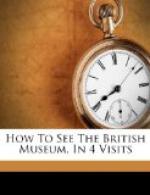The visitor, however, cannot leave the British Museum, having wandered over it and examined its various curiosities, without getting something from his journey. It is full of suggestive matter, which, with a little direction, may be turned to useful account by large classes of the people. It affords glimpses into the mysteries of the Animal Kingdom, with all its varieties, its wonders, its traceable progresses, its past and extinct forms, its promises of future developments. Then the mineralogical galleries afford the general visitor a peep at the formations of the earth; the various developments of minerals; the natural state of ores and stones which most men see only in their manufactured state. From the mineralogical tables the visitor stepped aside to examine the wondrous revelations of extinct animal life recovered from the bowels of the earth; he saw the colossal megatherium, the towering mastodon, and the great Irish elk. He understood something of the progress of animal life, from the fishes and the saurians. Then he passed into the Egyptian room, and found himself surrounded with the preserved bodies of the ancient Egyptians; he examined their household gods; he pried into their coffins; he saw their food; he was familiarised with their apparel. Still proceeding onward, he came to the beautiful bronzes; and then he saw the wonders that the ancient tombs of Etruria disgorged. He still advanced in the galleries, till he came to a room that was a little museum in itself—an exhibition of the curious industries of many different countries. Here were Buddhist temples; Chinese chopsticks; marvels from savage islands; a tortoise-shell bonnet; a Chinese bell;—in short, a room packed from the ceiling to the floor with a compact mass of curiosities. And then he left the upper floor of the building, after having spent two days there, through two towering cameleopards. He came a third time, and at once passing many things that tempted him by the way, he passed on into the great and wonderful Egyptian Saloon. Here he lingered for hours over ancient Egyptian tombstones; before colossal sarcophagi; thinking of the tough work Belzoni must have had of it with the young Memnon; endeavouring to realise the approach to the ancient Egyptian temples through rows of colossal and majestic sphinxes. Next he passed on to the ruins of Nineveh, and its mystic mounds. Here he was with Layard for a time, dreaming of the ancient Assyrians and their winged bulls. Hence he passed into the Lycian room, and saw something of the strange remains of the Xanthus of old; and then, probably, he went home to dream of these great marvels of the times gone by. But he came again; and this time hovered throughout the day amid the ruins of the arts of ancient Greece. And now he has examined these; and he may leave the national museum, assured that he has some useful knowledge of the curiosities which scientific men have gathered from the remote parts of the world, for the benefit of the learned resident in England.




